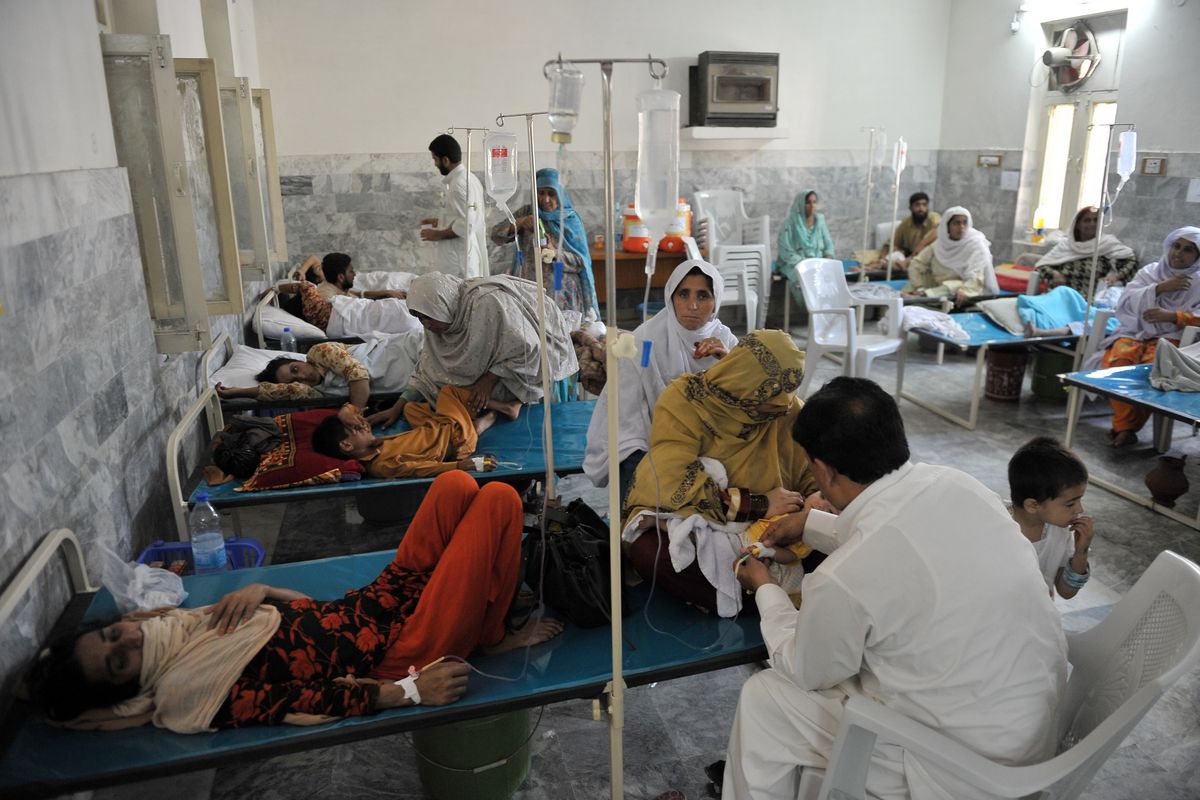Missed chances at life: Critical ICU bed shortage claims lives in Pakistan's KP province
Province has just 0.97 ICU beds per 100,000 people, half the country as a whole and far below regional standards
Kamran Ali
Correspondent Nukta
Kamran Ali, a seasoned journalist from Khyber Pakhtunkhwa, Pakistan, has a decade of experience covering terrorism, human rights, politics, economy, climate change, culture, and sports. With an MS in Media Studies, he has worked across print, radio, TV, and digital media, producing investigative reports and co-hosting shows that highlight critical issues.

File Photo: Healthcare workers attend to patients in an overcrowded children's hospital amid critical ICU bed shortages throughout Khyber Pakhtunkhwa province.
Shutterstock
Government promises upgrades but doctors report persistent systemic failures
Private ICU care costs between PKR 15,000 - PKR 30,000 daily, unaffordable for most
Through the shadowy passages of one of the oldest and largest public hospitals in northwestern Pakistan, Fayaz Chitrali relives a desperate race against time—a night etched into his memory forever. Not for what he managed to accomplish, but for what remained beyond his reach.
His 80-year-old father, already battling a severe lung infection and diabetes, needed immediate intensive care.
Fayaz moved frantically through Peshawar's Lady Reading Hospital's corridors—pleading with staff, searching every ward, clinging to hope—but the Intensive Care Unit (ICU) beds were full, with no space for one more patient.
By morning, it was too late; his father had passed away.
"If only we had secured an ICU bed that day, perhaps my father would still be with us," Fayaz told Nukta, his voice barely concealing his grief.
Breathless in the corridor
"It's not just my father," he added. "So many young people have lost their lives for the same reason. When there are no ICU beds available, you're no longer fighting the illness—you're just waiting for death."
Fayaz's story is not an isolated incident. Across hospitals in Pakistan's northwestern Khyber Pakhtunkhwa (KP) province, especially in emergency wards, the critical shortage of ICU beds continues to haunt countless families.
Last year, Musa Khan, a journalism student at the University of Malakand, died following a traffic accident—his final hours tainted by the healthcare system's devastating failure to respond in time.
Despite the severity of his injuries, he was turned away from the Hayatabad Medical Complex (HMC) in Peshawar due to the unavailability of an ICU bed.
Denied critical care when he needed it most, Musa's death underscores the troubling gaps in KPs medical infrastructure and raises urgent questions about the province's emergency preparedness.
Healthcare on the brink
For Dr. Asfandyar Bettani, every time he must inform a patient's family that no ICU bed is available, it feels like a personal failure—one that gnaws at his conscience as both a doctor and a human being.
"We recommend ICU admission because we know it's a matter of life and death," said Dr. Bettani, the provincial president of the Young Doctors Association. "But when we can't secure a bed, the shame is so intense that we begin to resent our own profession."
According to Dr. Bettani, the problem extends beyond overcrowded urban hospitals to the systematic neglect of peripheral healthcare facilities. "This crisis will persist until fully functional ICUs are established in remote areas and district hospitals," he emphasized.
At Lady Reading Hospital (LRH), the largest medical facility in Khyber Pakhtunkhwa, the disparity is stark—only 34 ICU beds are available against a minimum requirement of at least 80. This significant shortfall reveals the profound systemic gaps in critical care capacity throughout the province.
Speaking to Nukta, spokesperson for Lady Reading Hospital Muhammad Asim revealed that the facility receives up to 10 critically ill patients requiring ICU care daily, yet more often than not, all beds are already occupied.
"Patients typically present with multiple complications, which prolongs their stay and delays bed turnover," the spokesperson explained. Consequently, many critical cases must be referred to other hospitals, further straining an already overwhelmed healthcare system.
ICU shortage
According to data from KP's Health Department, obtained by Nukta, the province has approximately 399 functional ICU beds across various hospitals serving a population of 40.85 million, placing the ICU bed capacity at just 0.97 per 100,000 people. "An additional 109 ICU beds remain unused, lying in storage due to lack of space or operational challenges, while 43 beds are currently out of service and awaiting repairs," the data revealed.
Despite growing healthcare needs, Pakistan's critical care infrastructure remains severely underdeveloped. Data published on the U.S. National Institutes of Health (NIH) website places the country's ICU bed capacity at approximately 2.1 per 100,000 people, amounting to roughly 5,097 ICU beds nationwide.
This figure pales in comparison to several countries in the region. India reports an estimated 10.9 ICU beds per 100,000 population, while Iran and Sri Lanka maintain 14.0 and 2.4, respectively. Hong Kong offers 7.6, and Taiwan leads with a substantially higher ratio of 29.0 ICU beds per 100,000 residents.
Hakeem Zada, proprietor of the Mubarak Life Saving ICU Centre in Peshawar, told Nukta that while private ICU facilities do exist, they are few in number and financially inaccessible for most patients. "Charges for an ICU bed in the private sector typically range between Rs15,000 to Rs30,000 per day, with additional costs for ventilator support and other specialized services," he added.
"Due to the overflow of ICU-bound patients and established medical protocols, preference is often given to younger patients who have a higher likelihood of recovery," he explained, highlighting the agonizing triage decisions healthcare providers must make during critical care admissions.
Government promises ‘change’
Ihtisham Ali, Health Advisor to the Chief Minister, acknowledged the critical shortage of ICU beds but insisted that substantive changes are already under way.
"We have implemented a strategic plan to upgrade our existing ICU units and enhance their efficiency," he explained. "We are also in the process of establishing new ICUs and expanding bed capacity. These enhancements will soon be integrated into the healthcare system, significantly improving our ability to manage critical cases."
"A strategy is in place to upgrade our existing ICU units and make them more efficient," he explained. "We are also in the process of adding new ICUs and increasing bed capacity. These additions will soon become part of the system, helping us manage critical cases better."
Attaullah Khan, spokesperson for KP's health department, told Nukta that 35 ICU beds would soon be added to HMC, while efforts were also under way to set up ICUs at District Headquarters Hospitals (DHQs) in a bid to address the shortage of critical care facilities.
While the government's roadmap offers hope, for families like Fayaz Chitrali's—and for physicians like Dr. Bettani—the true measure will be how swiftly and effectively these promises materialize into reality—or don't.










Comments
See what people are discussing